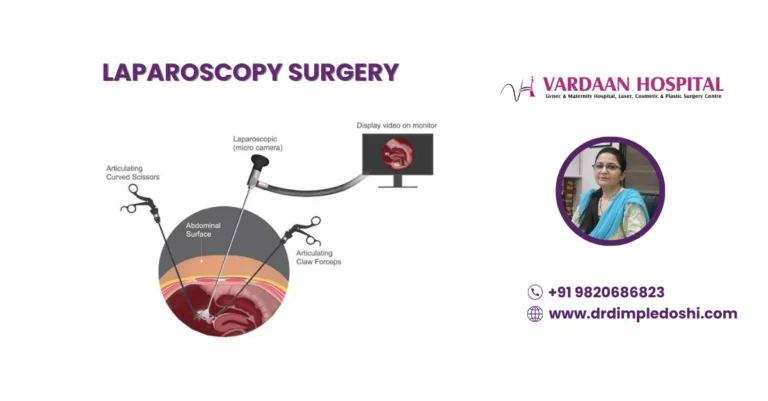Laparoscopy and Diagnostic Laparoscopy Treatment: Procedure, Benefits, Recovery & When You Need It

What Exactly is Laparoscopy?
Laparoscope is a tube with a camera inserted into your pelvis to get a clear view of the treatment area. Laparoscopy used for diagnosis is called diagnostic laparoscopy and for surgery called laparoscopic surgery.
Surgeries done by laparoscopy require only a few minimal incisions. Laparoscopy’s use in surgery is an effective alternative to traditional surgical methods that may require larger incisions.
What is the purpose of Laparoscopy?
Laparoscopy serves both diagnostic and therapeutic purposes. It is mainly used to:
- Diagnose conditions: When imaging tests like ultrasounds, CT scans, or MRIs fail to provide conclusive insights, laparoscopy helps find underlying issues.
- Treat conditions: Beyond diagnosis, laparoscopy allows surgeons to perform surgeries like removing cysts, repairing hernias, and treating endometriosis.
- Monitor progress: In some cases, it can be used to assess the effectiveness of ongoing treatments for chronic conditions.
What is the Role of Laparoscopy in Diagnosis?
Diagnostic laparoscopy is invaluable when your condition is difficult to diagnose using non-invasive methods.
This procedure helps your doctor to:
- Directly visualize organs: Examine the liver, gallbladder, uterus, ovaries, fallopian tubes, appendix, and intestines in real-time.
- Detect early-stage issues: Spot problems like fibroids, adhesions, small tumors that are otherwise invisible on imaging scans.
- Biopsy capability: Tissue samples can be taken during the procedure for further analysis, aiding in diagnosing cancers and infections.
- Determine infertility causes: It is a key diagnostic tool for unexplained infertility. It helps evaluate your structural issues in the reproductive organs.
Which conditions can be treated laparoscopically?
Laparoscopy can treat:
- Reproductive issues: Ovarian cysts, ectopic pregnancy, endometriosis, and uterine fibroids.
- Digestive disorders: Gallstones, appendicitis, and hernias.
- Cancer management: Early-stage detection and treatment of ovarian, uterine, and colorectal cancer.
- Adhesion removal: Treatment of scar tissue caused by previous surgeries and infections.
How is laparoscopy surgery beneficial?
Benefits of laparoscopy are numerous and transformative:
- It is minimally invasive and results in reduced scarring and quicker healing.
- It offers shorter recovery time and allows you to return to normal activities within 7 days.
- It can reduce your risk of catching infection by decreasing exposure to external contaminants.
- It provides improved accuracy and ensures precise diagnosis and treatment.
- It reduces pain during your postoperative period compared to open surgery.
- Laparoscopic procedures allow you same-day discharge.
What are the steps followed in Laparoscopy Procedure?
Laparoscopic procedure involves a systematic approach:
- Preoperative preparation: Do fasting, medical evaluations, and anesthesia consultations.
- Incision creation: Small incisions will be made near the navel or other appropriate locations.
- Gas insufflation: Carbon dioxide gas is introduced to inflate your abdomen. This is done to create space in your abdomen for better visibility.
- Insertion of the Laparoscope: The camera attached to the laparoscope provides real-time images of your internal organs.
- Surgery: Depending on your need, diagnostic actions will be performed.
Closure: Laparoscopy will be taken out, then your surgeon releases gas, sutures incisions with dissolvable threads.
Does laparoscopy pose risks and complications?
Laparoscopy is generally safe, and like any surgical procedure, it has potential risks including:
- Infection: Infection can occur at incision sites.
- Bleeding: Minor bleeding is possible.
- Organ injury: Accidental damage to nearby organs.
- Reactions to anesthesia: Allergic reactions to anesthesia may occur.
- Postoperative pain: Mild discomfort from gas retention.
An experienced surgeon can significantly minimize these risks through expertise and careful handling.
What indicates your need for laparoscopy?
You might need a laparoscopy if you experience:
- Unexplained pelvic or abdominal pain.
- Infertility or reproductive system issues.
- Symptoms of endometriosis, fibroids, and ovarian cysts.
- Persistent gastrointestinal problems.
- Diagnostic uncertainty after imaging studies.
A detailed consultation with your doctor can confirm whether laparoscopy is the best option for you.
What happens during recovery after laparoscopy surgery?
Recovery after laparoscopy is smooth and quick. Here’s what to expect:
- Immediate post-surgery: You may feel drowsy or experience mild nausea due to anesthesia.
- Incision care: Follow your surgeon’s instructions for keeping your incision area clean.
- Activity restrictions: Avoid doing heavy lifting activities for 7 days at least.
- Pain management: Over-the-counter pain relievers can reduce mild discomfort.
- Follow-Up: Timely checkups with your doctor ensure proper healing and identify any potential complications.
Why does an experienced laparoscopic surgeon understand you better?
An experienced laparoscopic surgeon Dr. Dimple Doshi brings:
- Technical Expertise: Years of practice ensure precision and reduced risks.
- Diagnostic Acumen: She identifies subtle signs that might be overlooked otherwise.
- Empathy and communication: Experienced laparoscopy surgeon surgeon at Vardaan Hospital, Mumbai will listen to your concerns and explain procedures clearly, all while easing your anxiety.
- Personalized care: Tailored advice and treatment plans are provided for addressing your unique needs.
Role of an experienced surgeon plays a crucial role in the success of the procedure.
Frequently Asked Questions
Q1. How long do I need to rest after laparoscopy surgery?
Ans. You need 1-2 weeks of rest, but light activities can resume in a few days based on your doctor’s advice.
Q2. Is it safe to walk after laparoscopic surgery?
Ans. Yes, gentle walking is safe and encouraged to prevent blood clots and support recovery.
Q3. Is daily travelling safe after laparoscopy surgery?
Ans. Daily traveling is generally safe after 7 days, depending on your comfort and your doctor’s approval.
Q4. Do I get periods after laparoscopic surgery?
Ans. Yes, you will get periods after laparoscopic surgery unless the surgery affects reproductive organs directly.
Q5. Should I avoid housework after laparoscopic surgery?
Ans. Avoid heavy housework for at least 1-2 weeks; light chores can be done based on your recovery stage.
Q6. Which gas is used for diagnostic laparoscopy?
Ans. Carbon dioxide (CO₂) is used to inflate your abdomen during diagnostic laparoscopy.
Q7. Which organs are checked in laparoscopic surgery?
Ans. Organs like the uterus, ovaries, fallopian tubes, liver, gallbladder, appendix, and intestines can be examined.
Q8. How long recovery takes after laparoscopic surgery?
Ans. Complete recovery can take 2-4 weeks.
Q9. How much time is taken for doing laparoscopic surgery?
Ans. Laparoscopic surgery takes 30 minutes to 2 hours, depending on the complexity.
Medical code for laparoscopic surgeon
CPT Codes for Laparoscopy
49320-Diagnostic Laparoscopy (peritoneoscopy), abdomen, peritoneum, and omentum
49321-Laparoscopy with biopsy (e.g., peritoneal or omental biopsy)
49322– Laparoscopy with aspiration of cyst or abscess

